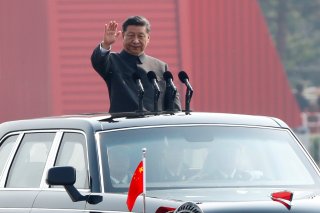Why China Will Not Cooperate with the West: The Pandemic Made Things Worse
Beijing sees vaccine diplomacy as a crucial means with which to convince other countries of its goodwill and friendship. It wants to seize the moral high ground to claim that it is superior to the West.
China, Coronavirus, and Great Power Competition
The events of the coronavirus pandemic have further exacerbated the tensions between China and the United States, not least because of the sky-high implications that are at stake. Given that China wants to portray itself as a responsible nation, one that is better than the West, it has spared no effort to promote its vaccines worldwide, particularly in countries who for various reasons are unable to procure the Pfizer or Moderna vaccines. While most foreign ministers would prefer to defer knowledge of vaccine science to health experts, in China, the foreign ministry has been on the forefront of vaccine promotion. The implications are obvious: Beijing sees vaccine diplomacy as a crucial means with which to convince other countries of its goodwill and friendship. Paired together with its Wolf Warrior diplomacy, in which China seeks to rebut what it sees as unfair allegations by unfriendly nations, Beijing intends to seize the moral high ground to claim that it is superior to the West.
To this end, it is likely that Chinese leaders are aware that it is being perceived somewhat in a negative light by its neighbors and they see the need to remedy it. In a June 2021 politburo study session, Xi exhorted party leaders to have better international communication in order to repair the country’s coronavirus-hit image and to win a battle of narratives with the United States and its allies. This is vital for China especially in terms of cross-strait relations which are presently at a low and which the possibility of conflict between Beijing and Taipei cannot be ruled out. Indeed, if war happens, China would have to demonstrate that it is the victim—either as a result of Taiwan’s intransigence—or because of the United States interfering in its internal affairs. While most countries in the region are unlikely to want to be drawn into a hot conflict (with the exception of Japan), the more China is able to present a positive image of itself, the more likely it is able to convince its neighbors of its just cause (jus bellum justum). This would increase both regional and international pressure on the United States not to put boots on the ground and thus further isolate Taipei from any external support.
Two major events are worth keeping tabs on. One is the CCP’s recently concluded one-hundred-year anniversary on July 1 where the Chinese government burnished and reinforced its credentials as the ultimate savior of the nation. The second will be the Beijing Winter Olympics in February 2022. In the first, the CCP showcased its domestic success, including its victory over the coronavirus pandemic. This can be most vividly seen in the spectacle of tens of thousands gathering at Tiananmen Square cheering and celebrating—all without masks—thus validating the CCP’s ability to govern China. In the case of the second, the CCP will attempt to tell the world the story of a mighty and powerful China which is able to overcome the odds of history and other geopolitical pressures to arrive at where it is, including having Beijing as the first city in history to ever host both the Summer and Winter Olympics. This would be a feather in Xi’s cap and would mark a remarkable milestone in his vision of national rejuvenation. Similarly, for the CCP, it will further validate its claim to ruling China and improve the lives of Chinese citizens. With so much at stake, China will want to do things on its own terms, and to forge its own path—with or without the West.
Benjamin Ho is an assistant professor in the China Programme at the Institute of Defense and Strategic Studies at the S. Rajaratnam School of International Studies. He is the author of China's Political Worldview and Chinese Exceptionalism is now available.
Image: Reuters

